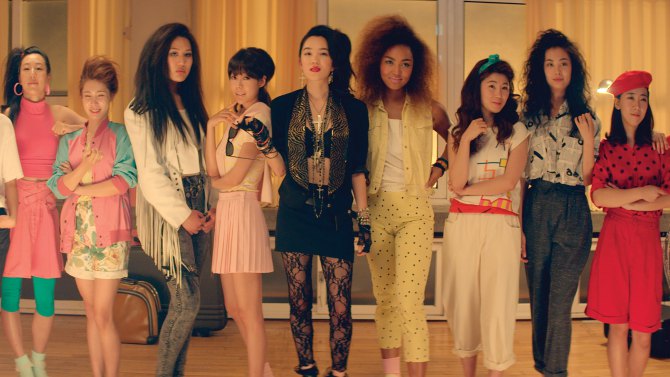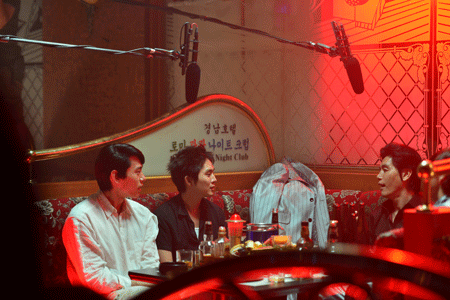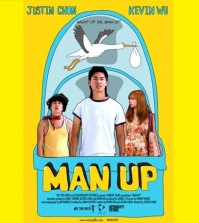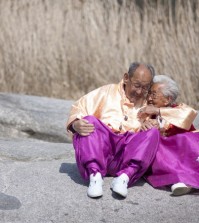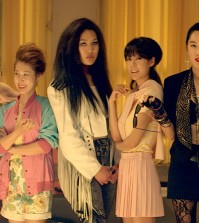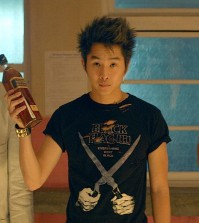- California Assembly OKs highest minimum wage in nation
- S. Korea unveils first graphic cigarette warnings
- US joins with South Korea, Japan in bid to deter North Korea
- LPGA golfer Chun In-gee finally back in action
- S. Korea won’t be top seed in final World Cup qualification round
- US men’s soccer misses 2nd straight Olympics
- US back on track in qualifying with 4-0 win over Guatemala
- High-intensity workout injuries spawn cottage industry
- CDC expands range of Zika mosquitoes into parts of Northeast
- Who knew? ‘The Walking Dead’ is helping families connect
Q&A with ‘Seoul Searching’ director Benson Lee
“Seoul Searching” recently premiered at Sundance Film Festival on Jan. 23
By Kim Young-jin
Growing up outside of Philadelphia in the 1980s, filmmaker Benson Lee felt removed from the people around him, as if he were “living in a bubble.”
One of only a few Asian-Americans at his school, he says he was treated like a foreigner. At home, he clashed with his parents, who were raised on Korean values.
Lee got a dose of perspective in high school, when his parents, exasperated with their wayward son, shipped him off to a summer camp in Seoul, where foreign-born Korean teenagers were sent to learn about their ancestral homeland.
Lee revisits this pivotal summer in his latest project, “Seoul Searching,” a romantic teen comedy filmed in Korea that will premiere at the Sundance Film Festival on Friday. The movie, the recipient of a location incentive from the Korean Film Council, seeks to capture the struggles of growing up across two cultures.
Based on Lee’s experience, Seoul Searching takes place at the government-sponsored program for overseas Koreans, who are known as “gyopo” in Korean. After arriving from the United States, Germany, Mexico and elsewhere, the characters are thrown together at the camp in Seoul, a city that was far less cosmopolitan at that time than it is today.
Instead of dutifully learning the culture, however, the campers behave much like one would expect of teenagers in a foreign land. They party and fall in love. But like Lee, the characters learn to build relationships and most importantly, realize they are not alone.
“It’s interesting because I don’t know many films that express the story of gyopos within a context of a teen comedy,” Lee said during a recent interview at C-47, a post-production studio in Gangnam, southern Seoul.
“There are a lot of people who don’t really understand what it’s like for people to have to live in this duality and how it affects their youth,” said the director, known for his 2008 documentary “Planet B-boy” and 2012 Sony Pictures film, “Battle of the Year: The Dream Team.”
Backed by a bouncy 1980s soundtrack, the movie aims to capture the feel of the era’s classic teen comedies. But where those films often depicted Asians as marginal characters or the butt of jokes, Lee portrays the nuances of their identities.
The cast includes well-known actors, including Justin Chon (“21 & Over,” “The Twilight Saga” series) as Sid Park, a punk-rock rebel based on Lee; and Korean actor Cha In-pyo as a teacher who becomes Sid’s mentor. The ensemble also includes first-time actors found through a casting call on Facebook.
The film is included in the festival’s Premiers lineup, a “showcase of world premieres of some of the most highly anticipated dramatic films of the coming year,” according to the festival’s official website.
With Seoul Searching set to screen in Park City, we spoke to Lee about filming in Korea and his hopes for the movie.
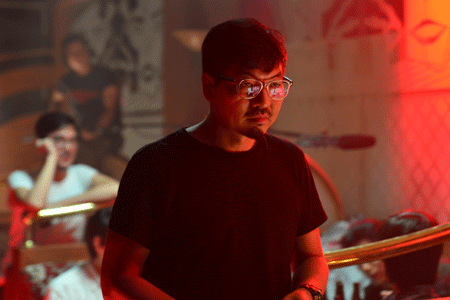
Filmmaker Benson Lee stands on the set of “Seoul Searching,” at a nightclub in Dongdaemun, eastern Seoul in August 2014. (Korea Times photos by Shim Hyun-chul)
Q: Tell us about the film and its characters.
A: Sid, who is a punk rebel, meets Grace (Jessika Van), who’s the pastor’s daughter and has lots of issues. Klaus (Teo Yoo) is a very proper German guy who aspires to go to business school and become the first big Korean-German banker. He meets Kris (Rosalina Leigh), an adoptee, who is returning to Korea for the first time, and they go on a journey together to find her mother.
Sergio (Esteban Ahn), who is from Mexico, is sort of like the Latin lover, Don Juan guy. He meets Sue-jin (Byul Kang), who is this very independent tomboy, future feminist and they go their own journey as well.
It’s a coming-of-age movie about these kids, who, because they meet people who are very different from them learn a lot about themselves and their place in the world.
Q: What brings them together?
A: The common thread is that there is a big schism between them and their parents, because they were the first generation that was raised en masse outside of Korea.
Being Korean was like another identity. There was duality that a lot of us experienced, that at that time was very tough because there were more racial tensions, and we were disconnected from the world and a lot of us lived in bubbles.
But our parents also had a lot of issues. Because they were raised in Korea, and left the country going to countries that were not very accommodating for them, and where they never really felt accepted, that caused a lot of issues for my parents’ generation.
Q: What role does the surroundings — Korea– have in the characters’ personal growth?
A: It’s huge. Sid has a sub-story with his teacher Mr. Kim (Cha In-pyo), who reminds him a lot about his own dad. There’s a moment when he tells Mr. Kim about his father, and Mr. Kim says, “Well you’re not the only one who has that problem, that’s actually kind of normal in Korea, that sons can’t communicate with their fathers.”
To have this epiphany that you aren’t the only one — that this is a cultural thing — that’s huge, because no one really tells you that growing up, when you’re disconnected. When that happened to me (that summer), I was like, “Wow, I’m not special, I am not suffering on my own.”
Q: What was it like portraying Korea in the 1980s?
A: Korea has had its own facelift since that time. It’s really modernized quite a bit — Gangnam in 1986 barely existed.
We didn’t do a lot if shooting in Seoul, to be honest. We have some shots of Seoul, but we have to CG (computer graphic) those shots to make it look like the 1980s.
We didn’t have (the characters) walking on the streets of Seoul. When they were on the streets, we actually ended up shooting in areas outside of Seoul, which were small towns that looked like the 1990s and had a really old-school look to them. We used those places instead, pretending they were Seoul.
Q: What was it like to film in Korea?
A: There was a lot lost in translation. It wasn’t because my crew wasn’t good, it was just because regardless of how good their English is, you really need to — even when you make movies in your own language — you have to be specific with what you want. People here are very respectful of the director and they are kind of careful with what they say, but also repress what they say, and that can create some misunderstandings. But it was a great experience.
Q: What do you hope to accomplish with the film? Who will be the audience?
A: My goal was to make a movie about the Diaspora of Koreans told through the story of the children, and make it entertaining and make people have a good time, but also learn something from it.
I feel it is a film that will cater to young people as well as people in their 40s just because it’s a 1980s (style) film and the music and style are very authentic in that respect.
For me, this is very much a global movie. It’s just intriguing because outside of the surface of these characters, they are normal kids who want to have a good time. And they are having the summer of their lives. I feel most people once they get over that hump and start paying attention to the story, they’ll be able to relate to it in many ways. At the end of the day, a story is a story.








